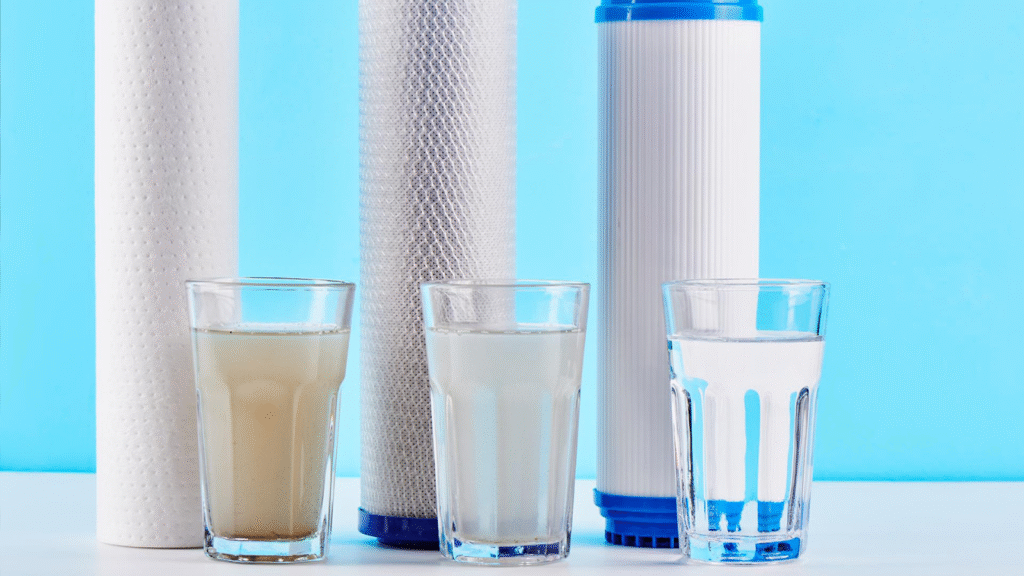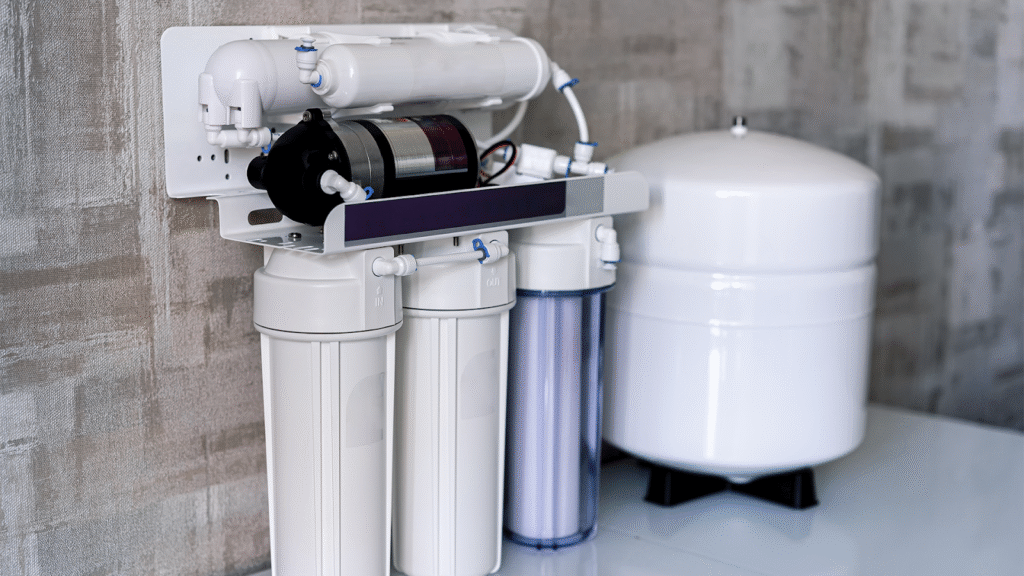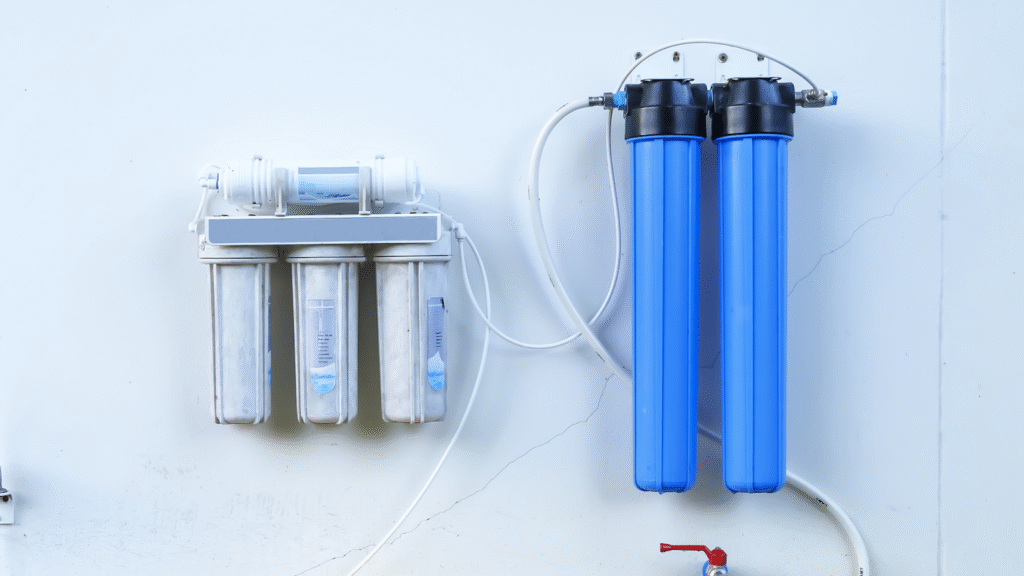For many homeowners in Edmonton, hard water is a daily frustration that quietly drives up costs and degrades the quality of life. From white spots on dishes to dry, irritated skin and early appliance failure, hard water leaves a visible and costly footprint.
Edmonton’s water is sourced from the North Saskatchewan River, which naturally contains minerals like calcium and magnesium. According to EPCOR, Edmonton’s municipal water has an average hardness of 165 mg/L as CaCO₃, which classifies it as “hard water.” That means every shower, every laundry cycle, and every glass of tap water carries a high concentration of calcium and magnesium minerals. Over time, these minerals accumulate inside pipes, water heaters, and appliances, creating a scale that restricts water flow, reduces efficiency, and shortens equipment lifespan.
This comprehensive guide will explain the science, technologies, costs, and environmental considerations behind water softening systems, with a specific focus on what works best in Edmonton’s unique conditions.
Table of Contents
ToggleWhat Is Water Hardness?
Water hardness is defined by the amount of dissolved calcium and magnesium in your water. These naturally occurring minerals are picked up as water flows through soil and rock. While not hazardous to health, hard water can wreak havoc on plumbing systems, appliances, and even personal hygiene routines.
Water hardness is typically measured in:
- Milligrams per litre (mg/L) or parts per million (ppm)
- Grains per gallon (GPG)
| Hardness Level | mg/L (ppm) as CaCO₃ | Grains per Gallon (GPG) |
| Soft | 0 – 60 | 0 – 3.5 |
| Moderately Hard | 61 – 120 | 3.6 – 7.0 |
| Hard | 121 – 180 | 7.1 – 10.5 |
| Very Hard | > 180 | > 10.5 |
Edmonton falls in the “hard” category, averaging 165 mg/L. Without treatment, homeowners face clogged showerheads, brittle laundry, and increased energy costs due to limescale buildup.
How Water Softeners Technologies Work
Water softeners are designed to remove or neutralize hardness minerals. The most common and effective method is ion exchange, where calcium and magnesium ions are swapped with sodium or potassium ions.
Ion Exchange Process:
- Hard water enters the system and passes through a resin bed charged with sodium or potassium.
- The resin attracts calcium and magnesium and releases sodium or potassium in exchange.
- Once the resin is saturated, the system regenerates by flushing the hardness ions away using a brine solution.
System Components:
- Mineral Tank: Where ion exchange occurs
- Brine Tank: Holds the salt or potassium solution used for regeneration
- Control Valve: Regulates flow and triggers regeneration cycles
Alternative systems like Template Assisted Crystallization (TAC), magnetic descalers, and reverse osmosis (RO) also play roles in specific contexts, which we will explore in detail below.
Comparing Water Softener Technologies in Edmonton
Let’s break down the main technologies available today and how they stack up for Edmonton homeowners:
a) Salt-Based Ion Exchange Softeners
Best for: Most residential applications in Edmonton
- Pros:
- Highly effective
- Time-tested and widely supported
- Customizable sizes for all home types
- Cons:
- Requires regular salt replenishment
- Produces brine waste
b) Salt-Free Conditioners (TAC/NAC)
Best for: Homeowners concerned with salt use or on septic systems
- Pros:
- Environmentally friendly
- Minimal maintenance
- Doesn’t add sodium to water
- Cons:
- Doesn’t “soften” in the traditional sense (no ion removal)
- Less effective in very hard water (like Edmonton)
For more on this system, check out Salt-Based vs Salt-Free Water Softeners.
c) Reverse Osmosis (RO) Systems
Best for: Drinking water purification; not full-home use
- Pros:
- Removes a wide range of contaminants
- Excellent for taste and odor improvement
- Cons:
- Expensive for whole-home setups
- Requires frequent filter changes
To see a deeper comparison of RO and ion exchange, check our blog on Reverse Osmosis vs Ion Exchange.
d) Magnetic & Electronic Descalers
Best for: Supplemental scale prevention
- Pros:
- Easy to install
- No chemicals or salt
- Cons:
- Mixed scientific support
- No actual ion removal
Check our dedicated blog on whether magnetic water softeners work on hard water or not.
e) Hybrid Systems
Best for: Households needing both softening and filtration
- Pros:
- Comprehensive solution
- Space-saving designs available
- Cons:
- Higher upfront costs
- It may require professional servicing
If you have a large household, you might want to consider a dual-tank system.
What Works Best for Edmonton Homes and Businesses?
Given Edmonton’s hard water (165 mg/L), salt-based ion exchange systems remain the most effective and reliable choice. They provide full removal of calcium and magnesium and are suitable for families, small businesses, and rental properties.
Recommended Add-Ons for Edmonton:
- Sediment Filters: Protect resin beds from clogging due to municipal sediment
- Carbon Pre-Filters: Improve taste and remove chlorine before softening
For commercial properties or households with specific needs, hybrid or twin-tank systems may provide better reliability and flow rate.
Cost of Water Softener Systems in Edmonton
Equipment Costs:
- Basic ion exchange units: $1,000 – $1,500
- Advanced systems with digital metering: $1,800 – $2,500
- Hybrid filtration/softener systems: $2,500 – $3,500+
Installation Costs:
- Standard install: $300 – $600
- Complex retrofits or plumbing adjustments: $700+
Ongoing Maintenance:
- Salt: $8–20/month, depending on usage
- Annual servicing: $100–$200 (if not DIY)
- Filter replacements (if any): $60–$100/year
Total investment over 5 years: ~$2,000–$4,500
Installation and Maintenance Best Practices
Installing a water softener is straightforward for most plumbers, but there are key things to consider:
- Location: Must be installed at the water main entry point
- Bypass Valve: Allows you to shut off the softener when needed
- Drain Access: Required for regeneration discharge
Maintenance Checklist:
- Refill salt regularly
- Clean the brine tank once a year
- Check the resin every 5 years
- Sanitize the system annually
Tip: Use solar salt for longer-lasting performance and reduced mushing.
Environmental & Health Considerations
Sodium Levels:
- Adds ~7.5mg of sodium per 1 liter of water (negligible for most, but relevant for sodium-restricted diets)
- Use potassium chloride as a salt-free alternative if needed
Eco-Friendly Options:
- Salt-free conditioners
- RO systems for drinking water only
- Efficient metered softeners that regenerate only when needed
Greywater Use:
- Brine discharge may not be suitable for irrigation or septic systems
Common Buyer Mistakes to Avoid
- Not testing water: Buy based on actual ppm, not guesswork
- Oversizing/undersizing: Leads to poor efficiency and higher costs
- Skipping professional install: Improper setups cause flow issues and damage
- Buying based on price only: Quality and warranty matter more long-term
Why Work With a Local Edmonton-Based Expert?
- We know the water: Our systems are designed with local hardness and sediment levels in mind
- We’re nearby: Faster service, easier support, no shipping delays
- We offer tailored solutions: Not every home needs the same system—we build around your needs
When you work with water softener technologies in Edmonton, you’re not just getting a product; you’re investing in local knowledge, dependable service, and long-term peace of mind.
Conclusion: Softer Water, Stronger Living
Whether you’re dealing with soap that won’t lather or appliances that seem to die too young, hard water can slowly drain your wallet and your patience. The right water softener doesn’t just fix a plumbing issue—it enhances your comfort, protects your investments, and improves your day-to-day life.
Edmonton’s hard water is no secret. But now, neither are the solutions.
Let Water Softener Edmonton help you choose a system that fits your needs, your home, and your future. Because better water isn’t a luxury—it’s a smart, lasting decision.
Note: For detailed product comparisons, installation services, and personalized consultations, please book your free water test with Water Softener Edmonton.
Call us: 587-400-0790
Email us: hello@watersofteneredmonton.ca




